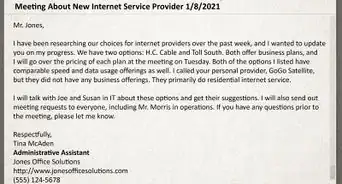This article was co-authored by Julia Yacoob, PhD and by wikiHow staff writer, Glenn Carreau. Dr. Julia Yacoob is a Licensed Clinical Psychologist practicing in New York City. She specializes in Cognitive Behavioral Therapy (CBT) for adults coping with a variety of symptoms and life stressors. Dr. Yacoob earned an MS and Ph.D. in Clinical Psychology from Rutgers University, and pursued specialized training at Weill Cornell Medical College, New York Presbyterian Hospital, Memorial Sloan-Kettering Cancer Center, the Institute for Behavior Therapy, and Bellevue Hospital Cancer Center. Dr. Yacoob is a member of the American Psychological Association, Women’s Mental Health Consortium, NYC Cognitive Behavioral Therapy Association, and Association for Cognitive and Behavioral Therapies.
There are 8 references cited in this article, which can be found at the bottom of the page.
This article has been viewed 1,499 times.
Are you feeling undervalued and overly judged by a micromanaging boss? Working with a micromanager who makes you feel like they don’t really trust you to do your job is tough, but there are ways to make the work environment healthier for both of you! Read on for detailed tips on dealing with a micromanager so you can comfortably get back to work, along with ways to recognize a micromanager and understand why they act the way they do.
Things You Should Know
- Start a dialogue with the micromanager and tell them how their behavior makes you feel. Set expectations and boundaries with them going forward.
- Anticipate their demands, give them regular updates, and ask for advice to make them feel in control. Reinforce good behavior, so they change their ways.
- Change your work style to gain the micromanager’s trust and use task management software for team accountability.
Steps
Working with a Micromanager
-
1Check in regularly to build trust between you and your manager. Your boss might feel like they have to watch you all the time due to a lack of trust. Develop trust gradually by keeping them informed about your work. Be open about what you’re doing; let them know how things are going and what you plan to do next.[1]
- Try an update like, “We released 5 new videos this week and are on track to launch another 8 next week. Does that line up with your goals for this campaign?”
- With regular updates, the micromanager won’t start getting excessively worried about your progress. In time, they’ll learn to step back and let you work!
- In your updates, try to reassure the micromanager and help them understand that they succeed when the whole team succeeds too.
-
2Get ahead of the micromanager’s demands. Be proactive if you know your boss will probably press you for information or an update! Propose a regular communication schedule that works for you while still satisfying their need for a progress report. When a micromanager knows to expect a check-in with you, they’re less likely to bother you with requests.[2]
- You could say, “I know you like to stay in the loop. Would be okay if I sent you an email update every Friday morning, so you know how the project is coming along?”
- Ask your manager how they prefer to communicate. Emails might be a good option so you both have a record of your conversations and updates.
Advertisement -
3Politely talk to them about how their behavior makes you feel. The best way to deal with a micromanager is to open a dialogue with them, so they understand how their actions affect you. Schedule a time to meet and diplomatically speak with them, focusing on the behavior and how it impacts you rather than their personality. Stay positive during the conversation, and be sure to smile![3]
- Offer clear, specific examples of their unhelpful behavior, so they can fully understand the problem and how to fix it.
- Don’t use the word “micromanaging.” Most people don’t respond well when accused of being a micromanager.
- Instead of saying, “You’re micromanaging me,” you could say, “It’s been tough to get work done on time when I’m also preparing daily updates for you. Could we look for a solution together?”
-
4Ask for advice to make them feel like they’re in control. When your boss feels like they have control of a situation, they’re more likely to give you space without trying to micromanage you. Create the illusion of control by asking for advice on specific issues so that when they agree to a solution, they feel like it’s their idea and not yours. That way, you get the needed changes, and they don’t feel powerless.[4]
- For example, you could say, “I’d really like to build my critical thinking and decision-making skills. I understand it’s a learning process, so I’d like your support and trust to help me grow. How do you suggest I do this?”
- Guide their participation by asking for independence while reassuring them they’ll be involved. You could say, “Could I tackle this project by myself and get your feedback at each milestone?”
-
5Establish boundaries and expectations for both of you. Sit down with the micromanager and discuss both of your roles and responsibilities openly. Identify what needs to be achieved along with time frames, expectations around communication, and what is expected from each of you. Then, set boundaries going forward that clarify what your manager will be involved with and what you’ll do on your own.[5]
- For example, you could set boundaries by saying, “I believe my track record proves that I can write and publish these press releases independently. Could I send you a copy of each one so you can follow my progress?”
- If your manager is a perfectionist, showing that you understand their expectations will reduce their anxiety and ensure you don’t have to redo work later.
- If they still want to be involved with every decision, gently remind them that their time is valuable and that delegating a few decisions might be more effective.
- Reassure them that you’ll consult them with any questions that might come up. They’ll feel better knowing you’re open to feedback.
-
6Reinforce the micromanager’s good behavior. Give the micromanager positive feedback so they understand what behaviors benefit you and what behaviors might not. Sometimes feedback comments can be beneficial.[6] When they do something helpful, thank them while specifying what they did and how it made a difference. Without feedback, it’s hard for micromanagers to understand when they’re helping and when they’re hurting.[7]
- For example, you could say something like, “I appreciate your trust in me to finish this project by the deadline. It really motivated me to do my absolute best.”
- That way, you’re subtly showing the micromanager that encouraging you and trusting you to do your work is the best way to work with you.
-
7Identify your boss’s expectations and adapt your work habits to match them. Think about your work ethic and whether your boss finds it satisfactory. Has anything happened that might make them feel like they can’t trust you? Analyze the possible causes of their micromanaging behavior, and work on improving your own behavior at work, so they don’t have any more reason to micromanage you.[8]
- For example, if you’ve missed several deadlines in the past month, your boss might feel like they have to stay on top of you about it. Think about how you can increase your productivity, so your boss will trust you with deadlines.
- Try to see things from the micromanager’s perspective, be ready for curveballs to get thrown your way, and be open about your needs, so you’re more resilient to their bad habits.
- Don’t be afraid to ask for help if you don’t know how to fix a problem. A good manager will provide support and advice so you can do your best work!
-
8Use task management software to develop team accountability. Set up a system that everyone in the team can use to see their collective progress.[9] When your manager can see what the team is working on and what still needs to be done, it can put their worries to rest. Look at different task management tools like monday, Asana, or ClickUp and suggest using one to your manager.
- Research the pros and cons of each software tool before recommending them to the rest of the team. That way, you can make an informed choice.
- If you can, offer to set up the system and teach the rest of the team how to use it. That will show your manager that you have initiative and drive!
-
9Raise the issue to a supervisor or human resources if it doesn’t stop. If you try all of the above tips and the micromanager’s behavior doesn’t change, consider speaking to their direct supervisor or a member of human resources to see what can be done. You could also call a team meeting to discuss company roles and expectations if the micromanagement is due to a big-picture issue involving everyone.[10]
- The micromanager might need to attend a management training course to correct their behavior. Suggest this to a higher-level boss.
- Team meetings can help everyone (including the micromanager) see the bigger picture and understand how their behavior affects the team’s progress.
- No matter how frustrating the micromanager is, don’t complain about them behind their back to the rest of the team. It’s better to address the issue head-on.
Recognizing a Micromanager
-
1Micromanagers are perfectionists who need to be in charge. Your boss could be a micromanager if they won’t let anyone else run things and insist on controlling everything without delegating tasks. If they’re perfectionists, they might not be team players and may obsess over the unimportant details without looking at the bigger picture.[11]
- For example, a micromanager might insist on documenting every detail of the work process or demand to be CC’d on every email.
- Severe micromanagement can even turn into bullying. Micromanagers get angry when decisions are made without consulting them and need to do everything themselves to consider it “done right.”
-
2A micromanager gets too involved in other people’s work. It’s easy to spot a micromanager because they often tell everyone else exactly how to do their jobs. And while it’s the manager’s job to direct everyone else, micromanagers monitor their team’s every move and constantly order them to change or redo their work. They’ll also ask for constant updates and overly detailed progress reports.[12]
- Micromanagers might even suggest unrealistic deadlines and get even more controlling when their team struggles to meet those deadlines.
- They tend to take pride in correcting everyone else’s work and dish out a lot of criticism instead of constructive feedback. They’ll also give complex instructions that are hard to understand.
-
3Being micromanaged leads to resentment and makes you feel powerless. Because micromanagers’ techniques are often ineffective and frustrating, you’ll also notice that they cause problems for everyone else. Those who work for a micromanager (including yourself) will feel untrusted and undervalued because you don’t have much freedom at work.[13]
- This can lead to resentment, low morale in the workplace, and a lack of motivation to get work done. It can also stifle progress and interfere with the mental health of everyone who works with the micromanager.
Understanding Why People Micromanage
-
1Micromanagers don’t trust the people they work with. Before you deal with the micromanager, it’s important to understand why they do it. Micromanagers might struggle to trust anyone but themselves and doubt the people they supervise. Their lack of trust can cause them to interfere with everyone else’s work if they assume it’s being done wrong.[14]
- Some micromanagers are arrogant and convinced that nobody is as smart or competent as them, although this isn’t always the case.
- Micromanagement can also result from a previous bad work experience. The micromanager might be projecting their memories and assumptions onto you.
-
2They don’t have a strong sense of boundaries or self-awareness. A micromanager might not even realize what they’re doing! They might have good intentions, wanting to minimize any uncertainty or chaos but inadvertently creating frustration. They also might not grasp workplace boundaries and the distinction between developing their team and doing so at the cost of everything else.[15]
- In a micromanager’s mind, your performance reflects their own. This can cause them to interfere too much with your work to ensure it reflects well on them.
-
3A micromanager might feel insecure and afraid of missing out. Sometimes, micromanagement can result from imposter syndrome. If they’re new to management and a little too eager to prove themselves, they might get overzealous about controlling everyone else to show how competent they are. They might also fear losing control if they miss anything, so they feel the need to make every decision.[16]
- When someone is new to management, they might start the job while still in the mindset of an individual contributor—which can make them think they have to monitor everyone with the same intensity.
-
4They might be stressed and feel pressured to do a good job. If their own supervisor (or the company culture as a whole) is putting pressure on them, a micromanager will put pressure on their team in turn. They feel like they have to deliver results as fast as possible, and their intense fear of mistakes and failure causes them to create a toxic workplace.[17]
- Study the micromanager’s attitude. Do they seem stressed most of the time? They might be under a lot of pressure and act out because of it.
-
5Your work style might conflict with theirs and trigger their concern. Micromanagers closely monitor you when they don't fully understand what you’re doing or planning to do. It doesn’t mean you’re a bad employee; for example, you might be a quiet person who doesn’t really speak up or give updates, so they don’t realize what you’re getting done.[18]
- Speed is another work style conflict. If you work a little slower than they’re used to, the micromanager might feel like they need to speed things up.
-
6They might be unhappy with your work performance. If you’ve failed to deliver in the past, missed deadlines, or aren’t showing any growth in your work, it can also trigger a micromanager. This is especially true if the micromanager has given you feedback, but you don’t show any signs of complying with it.[19]
- Micromanagers might also intervene if you don’t understand the work. It’s okay to get confused, but you should also ask for help rather than delay things by wondering what to do.
- You might have taken on too much work. It’s natural to want to prove yourself by saying “yes” to everything, but you might also end up dropping the ball because you have too much to do!
References
- ↑ https://www.cnn.com/2020/05/05/success/micromanagers-work-from-home/index.html
- ↑ https://www.cnn.com/2020/05/05/success/micromanagers-work-from-home/index.html
- ↑ https://www.askamanager.org/2008/09/how-to-deal-with-micromanager.html
- ↑ https://www.askamanager.org/2008/09/how-to-deal-with-micromanager.html
- ↑ https://www.psychologytoday.com/us/blog/mind-the-manager/201308/6-constructive-things-say-micromanager
- ↑ v161852_b01]. 15 July 2021.
- ↑ https://www.psychologytoday.com/us/blog/our-gender-ourselves/201306/4-ways-deal-hovering-boss
- ↑ https://www.askamanager.org/2008/09/how-to-deal-with-micromanager.html
- ↑ https://www.gallup.com/workplace/315530/ultimate-guide-micromanagers-signs-causes-solutions.aspx
- ↑ https://www.gallup.com/workplace/315530/ultimate-guide-micromanagers-signs-causes-solutions.aspx
- ↑ https://www.psychologytoday.com/us/blog/curating-your-life/202010/8-micromanaging-boss-traits-endanger-your-business
- ↑ https://www.psychologytoday.com/us/blog/curating-your-life/202010/8-micromanaging-boss-traits-endanger-your-business
- ↑ https://www.psychologytoday.com/us/blog/curating-your-life/202010/8-micromanaging-boss-traits-endanger-your-business
- ↑ https://www.psychologytoday.com/us/blog/curating-your-life/202010/8-micromanaging-boss-traits-endanger-your-business
- ↑ https://www.gallup.com/workplace/315530/ultimate-guide-micromanagers-signs-causes-solutions.aspx
- ↑ https://psychcentral.com/blog/why-anyone-would-want-to-control-you
- ↑ https://www.gallup.com/workplace/315530/ultimate-guide-micromanagers-signs-causes-solutions.aspx
- ↑ https://www.askamanager.org/2008/09/how-to-deal-with-micromanager.html
- ↑ https://www.askamanager.org/2008/09/how-to-deal-with-micromanager.html













































































